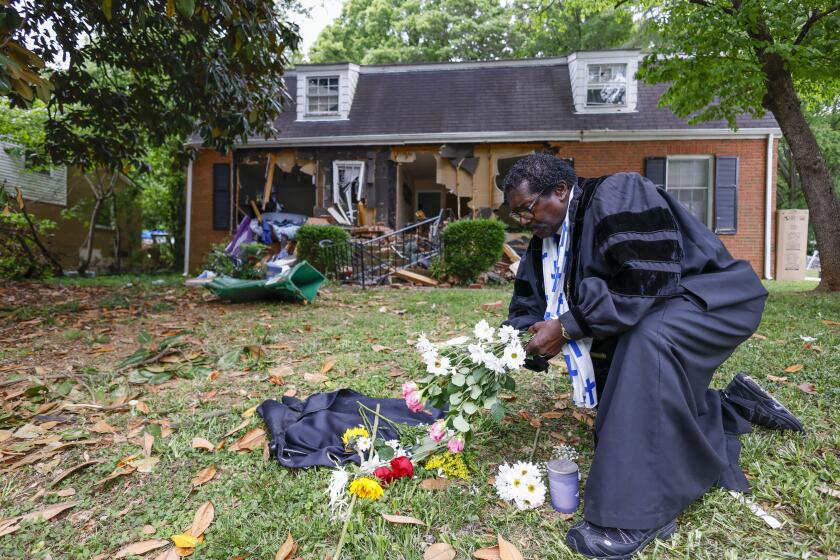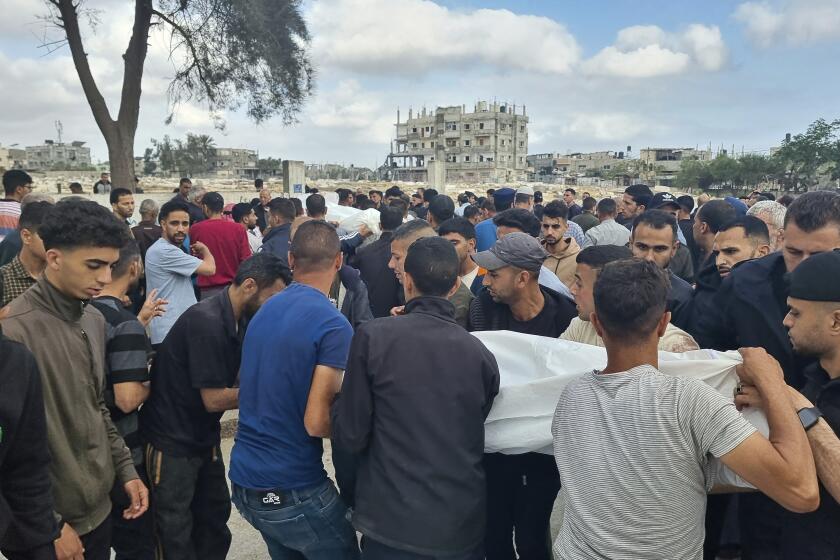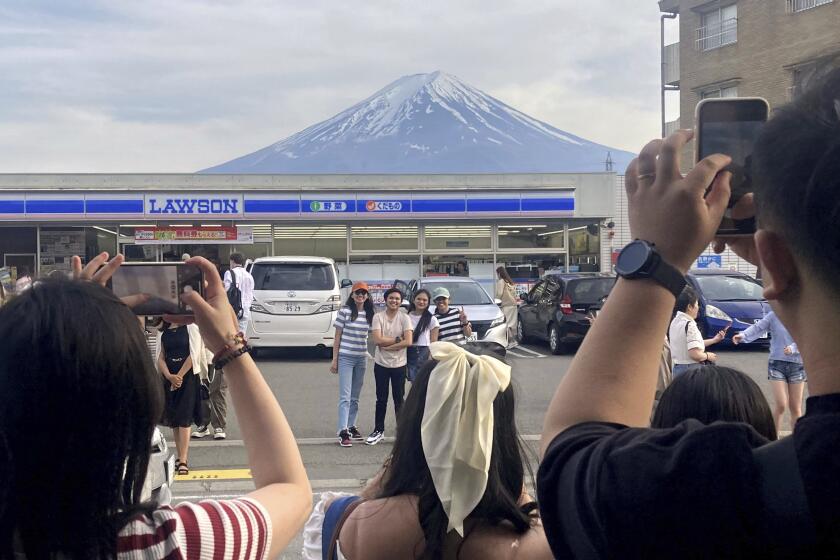Partial Vote Would Lack Full Credibility, Iraqis Contend
Firas Abdul Razzaq is looking forward to election day, even if Iraqi and U.S. officials aren’t sure he’ll get one.
Despite increasing official indications that his hometown of Fallouja might be excluded from parliamentary elections, Abdul Razzaq, 40, anticipates a peaceful beginning exercise in democracy in the insurgent stronghold.
“The people of Fallouja,” he predicted, “will stand at the side of the election organizing committee in order to make these elections a success.”
Others aren’t as optimistic. U.S. and Iraqi officials, including Secretary of Defense Donald H. Rumsfeld and interim Deputy Prime Minister Barham Salih, have floated the idea of excluding areas of Iraq that remain outside government control on election day -- scheduled for Jan. 31.
But an informal survey of residents in seven Iraqi cities reveals widespread opposition to a partial election, with many saying the move would discredit a process already viewed with suspicion.
“The government is trying to exclude areas of resistance because [the residents] are not loyal to them and will not vote for them, so it is another form of dictatorship,” said Ammar Haidat, 29, an engineer in the northern city of Kirkuk and a member of the Turkmen ethnic minority. “There will be elections and people will win, but it will not be successful and will not bring stability.”
Officials from Iraq and the U.S. repeatedly have said the parliamentary elections would not be delayed -- but that sticking to the schedule might mean leaving out certain rebellious areas. Doing so risks public rejection of the parliament, and the permanent constitution it will be charged with drafting.
It’s a rejection that could extend far beyond the so-called Sunni Triangle, the Sunni Muslim-dominated region north and west of Baghdad regarded as the heart of Iraq’s insurgency.
Ali Saleh Khoshnow, a 45-year-old author from Irbil, called partial elections “the most idiotic thing I’ve ever heard. Postponing the elections is the solution. I think the U.S. wants to do it just to say we had an election in Iraq.” Such expectations put pressure on U.S. and Iraqi forces to establish secure conditions for campaigning and voting in uncontrolled areas.
On Friday, the U.S. military ended a truce with a bloody offensive against the northern city of Samarra, where insurgents recently forced out the newly appointed police chief. Fallouja, west of the capital, remains in rebel hands, and many expect a major push to retake the city before December.
In Baghdad, U.S. and Iraqi forces face daily attacks from Al Mahdi army fighters in the vast Shiite Muslim district of Sadr City. The militants’ leader, Muqtada Sadr, hasn’t committed himself to participating in elections, but his representatives have implicitly endorsed the process and warned against any regional exclusions.
“There must be public and comprehensive elections in all parts of Iraq, and we welcome the credible and fair elections and not a partial one which would deprive some from balloting,” said Sheik Abdul Zahrah Swaiadi during Friday prayers at Sadr City’s Hikma Mosque.
Fears run high that insurgent violence -- aimed at preventing the vote -- will mar election day and scare potential candidates from running or campaigning.
Organizers also face skepticism from a public leery of the six major political parties, which dominated the now-disbanded Iraqi Governing Council. These parties are largely led by longtime exiles of questionable popularity. That, combined with a campaign season not scheduled to start for several months, has resulted in little electoral buzz.
Candidate registration won’t begin until early November, and formal campaigning is slated to begin in mid-December.
“There’s no trust in any party, or in anyone who would nominate themselves,” said Baghdad resident Fallah Kadhim, who didn’t plan to vote.
Bassem Saber, 42, a former journalist and employee of the now-dissolved Ministry of Information, complained that interim Prime Minister Iyad Allawi’s government, stocked with former Governing Council members, had done little to endear itself to voters.
“We don’t know anything about them, even after a year,” he said. “I predict that two-thirds of the citizens won’t vote due to lack of understanding of the candidates.”
The elections should result in a formal political ascension by Iraq’s long-marginalized Shiite majority. More than any other religious or ethnic group, the Shiite religious elite, the marjaiyah, have the influence to mobilize millions around a single issue.
On Friday, a representative of Grand Ayatollah Ali Sistani -- possibly the most powerful man in the country -- indicated that the marjaiyah would vet and endorse candidates.
“The marjaiyah will be responsible for the qualification of the nominees and their legitimacy,” Sheik Ahmed Safy said during prayers in Karbala. “The marjaiyah want honest elections and will not leave the people by themselves, so follow the orders of the marjaiyah.”
Apprehension about Shiite dominance extends even to relatively peaceful cities outside the Sunni Triangle.
“The Shiites for sure will win ... and this will create a problem. America does not want them and even some people who live here don’t,” said Abdel Aziz Mahmoud, 33, a teacher from Mosul.
Abdul Razzaq, the Fallouja resident, maintains that his neighbors will welcome the chance to vote. In a town that has become internationally synonymous with resistance, he sees the elections as another way to oust U.S.-backed officials.
“We all must participate in order not to allow the Americans, and their agents, to find their way again into power,” he said. “We are against the U.S. in everything except in elections.”
Special correspondents Roaa Ahmed in Mosul, Yalman Zainalabideen in Kirkuk, Othman Ghanim in Basra, Abdel Salaam Madany in Irbil, Saad Fakr Deen in Najaf, Saif Rasheed in Karbala, Raheem Salman in Baghdad and a special correspondent in Fallouja contributed to this report.
More to Read
Start your day right
Sign up for Essential California for news, features and recommendations from the L.A. Times and beyond in your inbox six days a week.
You may occasionally receive promotional content from the Los Angeles Times.






